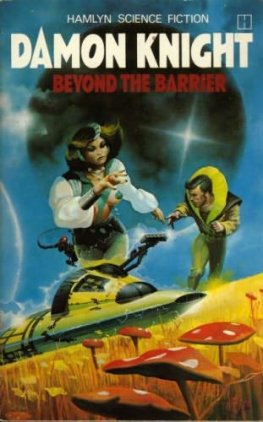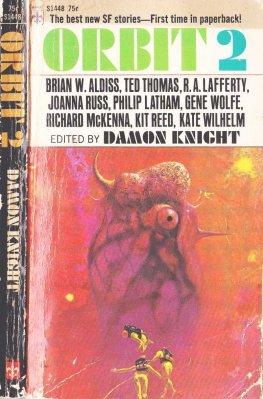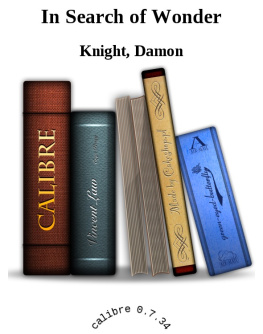Damon Knight - Orbit 19
Here you can read online Damon Knight - Orbit 19 full text of the book (entire story) in english for free. Download pdf and epub, get meaning, cover and reviews about this ebook. year: 1977, publisher: Harper & Row, genre: Science fiction. Description of the work, (preface) as well as reviews are available. Best literature library LitArk.com created for fans of good reading and offers a wide selection of genres:
Romance novel
Science fiction
Adventure
Detective
Science
History
Home and family
Prose
Art
Politics
Computer
Non-fiction
Religion
Business
Children
Humor
Choose a favorite category and find really read worthwhile books. Enjoy immersion in the world of imagination, feel the emotions of the characters or learn something new for yourself, make an fascinating discovery.

- Book:Orbit 19
- Author:
- Publisher:Harper & Row
- Genre:
- Year:1977
- ISBN:0060124318
- Rating:4 / 5
- Favourites:Add to favourites
- Your mark:
- 80
- 1
- 2
- 3
- 4
- 5
Orbit 19: summary, description and annotation
We offer to read an annotation, description, summary or preface (depends on what the author of the book "Orbit 19" wrote himself). If you haven't found the necessary information about the book — write in the comments, we will try to find it.
Orbit 19 — read online for free the complete book (whole text) full work
Below is the text of the book, divided by pages. System saving the place of the last page read, allows you to conveniently read the book "Orbit 19" online for free, without having to search again every time where you left off. Put a bookmark, and you can go to the page where you finished reading at any time.
Font size:
Interval:
Bookmark:
Orbit 19
By Damon Knight
The lines from Driving Montana on page 106 are reprinted from The Lady in Kicking Horse Reservoir, Poems, by Richard Hugo, with the permission of the author and the publisher. W. W. Norton & Company, Inc., New York, N.Y. Copyright 1973 by Richard Hugo.
Copyright 1977 by Damon Knight. All rights reserved. Printed in the United States of America. No part of this book may be used or reproduced in any manner whatsoever without written permission except in the case of brief quotations embodied in critical articles and reviews. For information address Harper & Row, Publishers, Inc., 10 East 53rd Street, New York, N.Y. 10022. Published simultaneously in Canada by Fitzhenry & Whiteside Limited, Toronto.
They Say
In some remarks about [Robert] Silverberg published elsewhere I found occasion to cause him mild pain by calling him five feet seven inches tall and the best writer in English. I am happy to set the record straight for the audience that this collection will entertain: Silverberg is five feet ten (although his compaction and grace is such that to a hulking type like me he seems shorter), and he may be listed among the best writers in English, a club of no more than ten members to which I would also admit Vladimir Nabokov, Evan S. Connell, Jr., Norman Mailer, Robert Coover, Richard Yates, Philip Roth, John Cheever, J. D. Salinger, and Bernard Malamud. Whether or not he is the best of this awesome company is a matter for specialists; the point is that names such as these must be invoked in order to indicate his current position in literature. In ten years if he and you, to say nothing of the world, can remain in place, he may be in a category where no names at all other than his own can be mentioned. Until that day I am content to stand by this more modest judgment.
Thinking About Silverberg, by Barry N. Malzberg, in The Best of Robert Silverberg (Pocket Books, 1976)
C. S. Lewis rejected a religious interpretation of sf advanced by Roger Lancelyn Green, adding: If he had said simply that something which the educated receive from poetry can reach the masses through stories of adventure, and almost in no other way, then I think he would have been right. Lewiss statement points to the paradoxical nature of science fiction as that which contains something akin to poetry, and yet is set apart from it by an aesthetic deficit. This longing for poetry in science fiction (as expressed in many reviews) is only surpassed by a prevalent taste for bad poetry, much as the enthusiasm for science among many sf writers is often overridden by their ignorance of it. In my opinion, science fiction is best described by such paradoxes, by the deep desire for the unattainable, only natural in a field of writing where ambition and publicly proclaimed aims so often exceed real potential and abilities.
The Science Fiction Book, An Illustrated History, by Franz Rottensteiner (Seabury Press, 1975)
According to one American astronomer, whole volumes of the Encyclopedia Galactica may be winging their way towards us, packed with all the scientific knowledge that an advanced and benevolent society might consider importantthe secrets of longevity and peaceful coexistence, the answer to malignant diseases, perhaps new sources of power that dwarf even the atoms explosive stockpile. Interspersed with these electrifying revelations could be instructions for learning Galactic, the language of interstellar communicationan open invitation to us to answer the call.
But would the possible dangers of answering a call from another civilization outweigh the likely benefits? The Czech-British astronomer Zdenek Kopal has visualized our confrontation with extraterrestrial beings intelligent enough to have discovered our existence: We might find ourselves in their test tubes or other contraptions set up to investigate us as we do guinea pigs. ... If the space phone rings, he pleads, for Gods sake let us not answer it.
Worlds Beyond, A Report on the Search for Life in Space, by Ian Ridpath (Harper & Row, 1976)
Machine-buffs are easy to cater to. Early sf magazines are full of outrageous machines, all cogs and rivets and columns and winking lights and trailing cables, so that the characters are perpetually tripping through a gigantic Meccano landscape. But the relation to reality is not as remote as might be supposed. You invent futures by magnifying pasts. Many outrageous futurist machines derive from a great age of invention, when diabolical engines proliferatedBruntons drilling machine of the eighteen-seventies, for example, would be perfectly at home in some subterranean horror planet designed by Harry Harrison or John Sladek.
Most inventors cared for invention itself, not the social consequences of the invention; this myopia is what one might call the Frankenstein syndrome. Horrific experiments, like the attempts of a French surgeon to preserve the dead by electroplating them, are the stuff of sf, even when they take place in real life. The illustration of Dr. Varlots experiment which appeared in the Scientific American in 1891 is real Mad Scientist stuff, complete with Moronic Laboratory Assistant, and could serve as an Amazing cover (indeed, mutatis mutandis, it often did so serve!). To have ones dear ones electroplated by return and at no great cost is not an unreasonable ambition; like much else which mightironically or notbe termed Progress, the idea seems to encompass hope and fear in roughly equal proportions.
Science Fiction Art, by Brian Aldiss (Bounty Books, 1975)
Viewed as an animal, man must continue to expand his domain, to extend his ecological range, to push out his territory; or he must find an innocuous ecological niche in another society, like the ant or the housefly, where he is too difficult or too expensive to eradicate; or he must ingratiate himself into a superior culture, like the dog or the cat; or he must die. Such has been the evolutionary history of Earth, of which man is a part. Both evolutionary and recorded history confirm a picture of man as a creature which must be dominant, which eliminates competing species, which has found ways of existing wherever endurance, adaptability, or intelligence can fit him to the environment or environment to him. This is science fictions traditional vision of man as he faces the universe.
Alternate Worlds, The Illustrated History of Science Fiction, by James Gunn (Prentice-Hall, 1975)
For all its persistence, the custom of Man eating Man (and vice versa) has never become really common . . . One problem is that widespread enthusiasm for the practice tends to be self-limiting, if not self-extinguishing. Another is that if the enthusiasm doesnt infect the intended donors, their uncooperative behavior leads to no end of wrangling and bitterness. And then there is the problem of disease.
Now, lumberjacks catch neither the Chestnut Blight nor the Dutch Elm Disease. Lobstermen are likewise immune to the ills that afflict their crustacean prey. But some diseases of poultry can be caught by their keepers; and with mammalian livestock, matters are much worse. When Man is both predator and prey, everything is catching, from the Common Cold on up to the Black Plague even before the donor is dispatched, along with a variety of ailments which can be ingested with the meal itself.
Some, like Tuberculosis, are quite rare, especially if one exercises reasonable care in selecting ones prey. Hepatitis is more common; more difficult to detect without an elaborate routine of testing and questioning of the donor, which tends to alarm him prematurely; and in the case of some virulent strains, almost impossible to destroy without burning the meat to a cinder and sometimes not even then. As for Trichinosis, one study has shown about a 2% infestation of pork and a 20% infestation of people. In theory, one could limit ones diet to devout Buddhists and Orthodox Jews; in practice, however, one can never be sure that the donor isnt a late convert. The usual precaution is simply to cook Man very thoroughly, as with pork only more so.
Font size:
Interval:
Bookmark:
Similar books «Orbit 19»
Look at similar books to Orbit 19. We have selected literature similar in name and meaning in the hope of providing readers with more options to find new, interesting, not yet read works.
Discussion, reviews of the book Orbit 19 and just readers' own opinions. Leave your comments, write what you think about the work, its meaning or the main characters. Specify what exactly you liked and what you didn't like, and why you think so.



